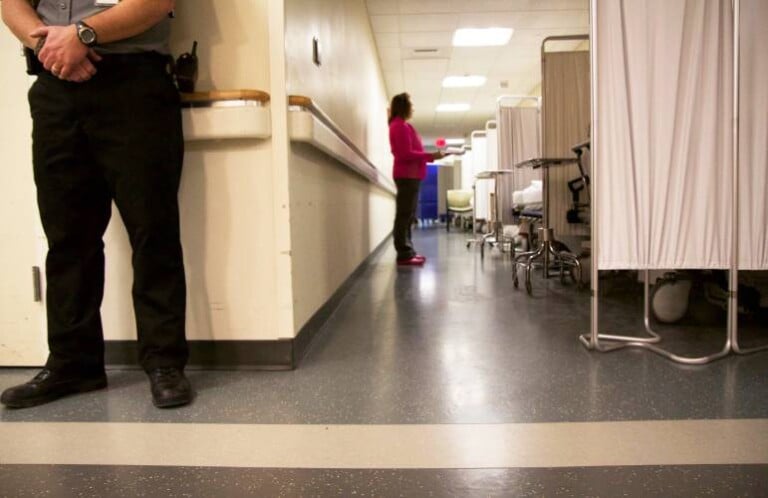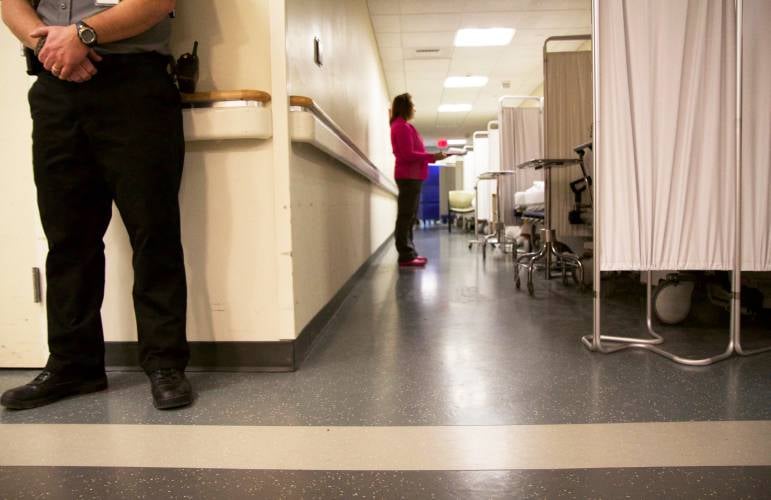Involuntary Emergency Admissions process adds complexity to already overrun hospitals

Flanked by an armed security guard and two nurses, Sarah was escorted through the hallways and waiting rooms at Elliot Hospital after she overdosed in January.
She was held involuntarily and moved to a secure holding area with two separate doors, each equipped with a set of locks and surveillance cameras.
“It was like entering a prison,” Sarah said, reflecting on her admission to the hospital’s emergency room after a mental breakdown following the distress of ending an eight-year relationship. “It was very embarrassing and a very demeaning situation.”
Sarah, who agreed to be interviewed as long as her real name was not used, is now living in Puerto Rico. Her story is one among many who have been detained in emergency rooms or holding areas in hospitals across New Hampshire on the belief they may be experiencing a mental health crisis.
Prior to the implementation of New Hampshire’s centralized system for involuntary emergency admissions in March 2022, individuals with mental illnesses were confined to emergency rooms for extended periods, sometimes stretching into weeks while waiting for a hearing that was mandated to take place within three days.
Ever since the new system was put in place, the process has been streamlined to provide timely hearings, but conditions in emergency rooms remain a problem.
Patients can be detained against their will when an Involuntary Emergency Admission petition is filed. This legal process occurs when compelling reasons exist to believe the individual’s mental health condition presents a potential danger to themselves or others.
In a lawsuit filed by the American Civil Liberties Union New Hampshire challenging the lack of due process in such situations, many individuals described their harrowing experiences when they were detained in emergency departments across the state. Sometimes they were locked in solitary confinement, secluded from other patients in windowless rooms.
These experiences were echoed by three attorneys in the state, who represent clients facing Involuntary Emergency Admissions.
“My clients have told me repeatedly that it’s worse than being in jail,” said Lauren Vallari, one of the few attorneys in the state representing these patients. “They have handcuffs on, either to bring them to the emergency department or to the (Designated Receiving Facility).”
‘You feel like a criminal’
When individuals facing a mental health crisis arrive at the emergency room, whether they come alone or with family members, police or ambulance personnel, they go through a preliminary assessment to evaluate their mental health condition.
The process of initiating an Involuntary Emergency Admission petition can be initiated by the attending clinician or a concerned family member.
After the petition is filed, a mental and physical assessment is conducted, and if the individual is determined to be a danger to themselves or anyone else, the patient is in the legal custody of the state Department of Health and Human Services.
By law, every patient with an involuntary admission petition is required to have a hearing within three days from the time the petition is signed. Because that rarely happened, the New Hampshire chapter of the ACLU filed suit against the state.
Sarah’s three-day stay in the emergency room might appear short, but for someone who experienced it firsthand, it was a traumatizing ordeal.
Once she was inside the secure area, two nurses approached her, asking her to strip and change into paper scrubs in the bathroom. The vulnerability of the situation intensified as they carefully checked for any potential weapons or drugs, adding to her distress.
Throughout her time there, Sarah faced a barrage of emotions and challenges that left a lasting impact on her, highlighting the importance of understanding and compassion in such critical settings.
“You feel like a criminal, that’s the only way I can describe it to you,” said Sarah. “The furniture is bolted to the floor, the bed is bolted to the floor; you are not even allowed to have a pen, and you are on a video camera.”
Even with a timely hearing, individuals have to wait until a bed in a mental health facility frees up, which could mean days or weeks without proper treatment.
“Many of our clients talk about their deterioration in that period, and sometimes they’re in there on their own,” said attorney Ellen Purcell. “They are literally confined.”
Before the new centralized process for involuntary emergency admissions to mental health facilities was put in place in March of last year, Patrick Dowling was confined to a room at Speare Memorial Hospital in Plymouth in 2014 for 11 days waiting for a hearing.
Dowling said it was the “worst period” of his life, because he wanted to get help but was not getting any.
“The only thing I was really looking forward to is having a shower, and I couldn’t even control that,” said Dowling. “I had a security guard at the front door watching me, and it just didn’t feel like I was being a health patient. It just felt wrong in general.”
Between March 21, 2022, and Aug. 18, 2023, a total of 3,488 emergency admission hearings were held for patients outside of a mental health facility.
Out of those, only 11 have been dismissed for failure to provide a timely hearing, according to the New Hampshire Circuit Court.
‘A voice over the phone’
Despite improved waiting times for hearings, the proceedings themselves are still problematic.
Patients don’t receive in-person hearing, with video calls a rarity as well. Approximately 75% of hearings are conducted solely over the phone, said attorneys, which raises questions about the effectiveness and fairness of such arrangements.
Attorneys have reported that clients often struggle to place their trust in telephone hearings.
“It’s a voice over the phone, some of them are concerned about voices they’ve been hearing,” said Purcell. “There really isn’t confidence in a judge who’s going to make the decision where you’re not seeing the judge, but just hearing the voice. It doesn’t feel real.”
In the past, patients used to be brought to the courtroom on the second floor of the New Hampshire Hospital after their wait for a bed was over, and would receive a face-to-face hearing with the presiding judge.
Since the implementation of the centralized system, these hearings now take place in hospital emergency rooms where the judge and attorneys participate remotely.
Judge Ryan Guptill said as much as he does understand individuals wanting to be heard in person, he said the process is evolving and the proceeding meets the obligations of due process under the Constitution.
“I wish we could do more, but I also think we have to think about meeting our other goal of providing everyone with a timely hearing,” explained Judge Guptill. “I don’t want to see a scenario where we start having the sheriffs go and put people in handcuffs, and bring them to courthouses for hearings.”
Virtual courts
The New Hampshire circuit courts, responsible for overseeing these cases, receive the petitions a day or two prior to the required hearing. Then, a notice with the hearing date is sent out to both the petitioner and the hospital. A legal counsel is also appointed to represent the patient.
Guptill presides exclusively over the state circuit court’s mental health docket, conducting involuntary admission hearings on a daily basis.
Guptill said he doesn’t approach the bench cold.
“I review every petition in advance. I’m checking both for the facts that are alleged to make sure I understand what the allegations are and also any legal issues that I’m spotting on the face of the petition,” he explained.
At the time of the hearing, all parties are virtually connected either through phone or video. Then the petitioner, a clinician or family member is called to provide testimony and may be questioned by the lawyer. If witnesses exist, they can be called to testify, too.
Then the patient is given a chance to speak on their case.
“This is my primary docket. This is what I do every day. It’s not something I’m sneaking in five minutes between other cases,” Guptill said. “I feel like one of the best things we can do is just let people say what they feel; a luxury we may not have had before.”
Guptill said he usually doesn’t make a decision on the bench. Instead, he takes time to think about the case and issues a written decision that goes out by the end of the business day, if possible, and by no later than the next business day.
Disparity in opportunity
Only certain facilities, such as Portsmouth Hospital, Concord Hospital Franklin, Parkland Emotional Wellness Unit, Elliot Hospital and Cypress Center have video capabilities that aren’t made available all patients.
Once a petition is filed and a bed is available in a treatment facility, patients are transferred accordingly. However, the type of hearing they receive depends on the petition’s filing location, not the transfer destination.
An added layer to the complexity of the issue is that the state has only four attorneys who represent clients in these cases. They try to be at several hospitals every day, even during telephonic hearings. But sometimes they just can’t be.
“It’s really hard to describe what we do, and it’s not lucrative,” said attorney Amy Davidson. “So for a number of reasons, they haven’t been able to get anybody else, and they probably won’t.”
Sarah expected a video hearing but ended up with a telephonic hearing instead.
“My feeling is that criminals get more priority than someone who has a mental health condition,” Sarah said. “If you have a mental health condition, there’s less chance to prove your case.”
Last week, state officials announced a series of investments and partnerships called “Mission Zero,” aimed at eliminating the practice of boarding patients with mental illness in hospital emergency departments by 2025.
This article is being shared by partners in The Granite State News Collaborative. For more information, visit collaborativenh.org.




































